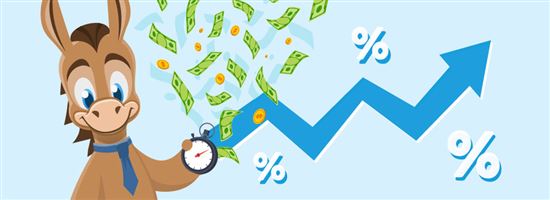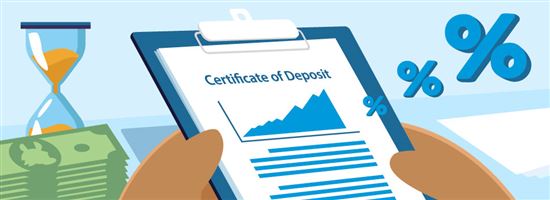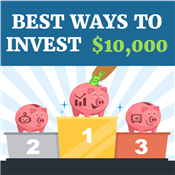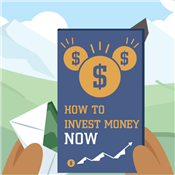Best Short Term Investment Options
Ad Disclosure: This article contains references to products from our partners. We may receive compensation if you apply or shop through links in our content. This compensation may impact how and where products appear on this site. You help support CreditDonkey by using our links.
The best short term investment options provide good returns with low risk. Here are the top 10 strategies for your short term goals.
 |
Get a Free Stock
- When you sign up, a surprise stock appears in your account
- You don't need money in your account to get your free stock
- You could get up to $200.00
What is a Short Term Investment?
 |
If you're looking to invest for less than five years, that's considered short term. Short term investments are usually made with specific goals in mind (a dream vacation, wedding ring, or down payment on a house).
Long term investments are meant for more distant goals like retirement.
With short term investments, you want to make money quickly WITHOUT losing your capital. Skip trendy stocks and options and look for low-risk and modest gain opportunities.
A short term investment is an investment you plan to hold for 5 years or less. Examples of short-term investments are high-yield savings accounts, CDs, money market accounts, treasury bills, and government bonds. The investment should easily convert to cash when the time is right.
That means more than just savings accounts that provide safety but negligible interest rates. You won't lose money in an FDIC-insured bank account, but you won't make much in return, either.
Keep reading for the top short-term investments to make your short term dreams a reality.
Top 10 Short-Term Investment Ideas
 |
A short term investment is usually held for 5 years or shorter. The goal is to grow your money for short term needs (such as for a house down payment). It should be low-risk with small, but reliable, returns.
A long term investment is held for decades (such as for retirement). So it can be riskier since there is time to ride out the ups and downs of the market.
1. Debt Payoff
Investments and paying off debt sound like two different principles. But are they?
Debt costs you money. The average credit card interest rate is 12.77% (and can be up to over 20%). This mean $10,000 in credit card debt can cost you $1,277 in interest in just a year.
It's very hard to find investments that give you that kind of return. In other words - debt will cost you more money than you can earn.
Don't forget, the interest keeps compounding until you pay it off. Before you know it, you've paid thousands of dollars in interest. You could have invested that money elsewhere instead of giving it to your credit card company.
As you pay your debt down, keep these things in mind:
- Pay more than the minimum. The more you pay off each month, the less interest you pay. As you lower your balance, you'll save on future interest charges. Eventually you'll see a full return on your investment. You then have money you can use on other investments (see below).
- Consider a balance transfer. Transferring to a 0% APR credit card can help you move the debt faster. You won't pay interest as long as you pay the debt off before the end of the introductory period.
Many cards charge a one-time balance transfer fee - often around 3% of the transferred amount. To avoid this, here are our top credit cards with NO balance transfer fee. This way, all your money goes straight to paying down the debt.
- Have a strategy. It's best if you focus on one credit card at a time. Choose the card with the highest interest rate and pay it down. Pay the minimum payment on the rest of your cards.
When you pay the first balance off, choose the next highest and so on. This helps minimize the interest you pay. It also furthers the return on your investment.
Sample Returns: 7.00% to 20.00% and up, depending on the interest rate charged on your debt
Even if you have only a little bit of money, you can still invest for the short term. The best options are high-yield savings accounts and money markets. You are guaranteed interest and you can easily withdraw if you need the cash.
2. Online Savings Account
Everyone needs an emergency fund. Credit cards are nice in a pinch. But not if it means putting yourself in debt again.
Big traditional banks often provide the lowest (worst) interest rates - as low as just 0.01%. That's pathetic.
Instead, look for high interest online savings accounts, such as the Platinum Savings from CIT Bank, and money market accounts. Online banks have less physical overhead, so they offer much higher interest rates and have less fees. Check to see if there's a promo code for CIT Bank right now if you decide to sign up.
Keep these things in mind when looking for an online savings account:
- Make sure automatic deposits are free. Many banks offer this service but require a minimum deposit. Read the fine print before making savings automatic. It's a nice benefit if you can do it, but you shouldn't pay for it.
- Make sure there are no miscellaneous fees. Minimum deposit requirements, inactivity fees, and monthly service fees are a few examples. Many online banks don't charge anything; look for those options when you can.
- Do you need ATM access? Some online banks will provide an ATM card that allows you to easily withdraw cash when you need it. Others will only allow you to transfer to a checking account. Shop for the best interest rate combined with the features you need. Check out the Top 5 Online Savings Accounts.
Sample Returns: 0.39% - 3.75%
Short term investments should have little risk and almost guaranteed returns. Safest options are high-yield savings, money market, and CDs.
Karen Lee, certified financial planner, Karen Lee and Associates LLC
CIT Bank Platinum Savings - 3.75% APY
- 3.75% APY with a balance of $5,000 or more
- 0.25% APY with a balance of less than $5,000
- $100 minimum opening deposit
- No monthly maintenance fee
- Member FDIC
UFB Portfolio Savings - Earn up to 3.26% APY
- Earn up to 3.26% APY.*
- No monthly maintenance fees.
- No minimum deposit required to open an account.
- Access your funds 24/7 with easy-to-use digital banking tools.
- Enjoy peace of mind with FDIC insurance up to the maximum allowance limit – Certificate #35546.
High-Yield Savings Premier - 3.80% APY
- No account fees
- Option to open individual or joint account
- FDIC insured up to $250,000 per depositor
- Only $500 minimum opening deposit
3. CDs
 |
If you don't need your money for a while, consider a Certificate of Deposit. Their interest rates are often higher than online savings or money market accounts.
The downside is you can't touch the money before maturity. If you do, you'll pay a penalty. This isn't always a bad thing, though. You tie the money up and forget about it.
Consider the following when choosing the right CD for your investments:
- Consider short-term CDs. Usually, the longer you invest your money, the higher the interest rate. But long-term CDs aren't the only way to make a decent return. Many banks offer excellent rates for 12-month CDs. And your money won't be tied up that long.
CD laddering is another great strategy. Instead of putting all your savings into a single CD, you split it up into different CDs with different terms. Then as each CD matures, you roll it over into a new CD with a new interest rate. This way you get the latest interest rate with each new investment. Of course, this only works during a time when interest rates are on the rise.
- Pay close attention to the offered rates. It's not unusual to find one bank offering 0.02% APY and another offering 2.50% for the same term. Also, many advertised interest rates require a minimum investment. If you don't deposit that much, you may make much less without realizing it.
- Know the early withdrawal penalties. Life happens. If you need your funds now, you should know what it would cost. Some banks charge 3 months of interest. Others may charge as much as a full year of interest. It depends on the term of the CD and the bank's requirements.
Clifford L. Caplan, president, Neponset Valley Financial Partners
High-Yield CD Rates - Up to 4.00% APY
- No fees
- $1 minimum deposit
- FDIC insured
| Term | CD Rates |
|---|---|
| 2 Month | 4.00% APY |
| 3 Month | 4.00% APY |
| 4 Month | 4.00% APY |
| 5 Month | 3.40% APY |
| 6 Month | 3.50% APY |
| 9 Month | 3.40% APY |
| 12 Month | 3.30% APY |
CIT Bank No Penalty CD - 3.75% APY
- Option to withdraw full balance and interest after 7 days of CD funding date
- $1,000 minimum to open an account
- 11 months
- No monthly maintenance fee
- Member FDIC
CD Rates - Up to 3.75% APY
- $500 minimum opening deposit
- FDIC insured
| Term | CD Rates |
|---|---|
| 6 Month | 3.75% APY |
| 12 Month | 3.00% APY |
| 24 Month | 3.35% APY |
| 36 Month | 3.25% APY |
| 60 Month | 3.00% APY |
4. Online Checking Account
You probably don't think of checking accounts when you think of investments. Your local branch probably offers a laughable interest rate, or none at all.
Many online checking accounts offer slightly higher interest rates, though.
Earning $200 for depositing $2,000 into a new account is effectively a 10% return on your investment. It's only a one-time bonus, but it still represents a big return. Check out current bank promotions now.
Before you sign on, keep these things in mind:
- Know the requirements for the bonus. A specific opening deposit, minimum monthly balance, or automatic deposits are common. Make sure you can meet the requirements in the timeframe to get the bonus.
- Know how long the money must sit in the account. Some banks also charge a penalty for early withdrawals or account closures.
- Read the fine print regarding the bank's fees. Minimum monthly balances, monthly service fees, and teller fees are just a few examples. Don't let the fees eat away at the return on your investment.
Sample Returns: 1.00%, plus any one-time bonuses
5. Roth IRA
 |
Roth IRAs are generally for long-term investments: think retirement. But there's a little-known secret: you can use yours if you are in a pinch. We don't recommend using a Roth IRA for the short-term. But it's there if you need it.
Roth IRA funds are after-tax dollars. Since you already paid the taxes, there's no early withdrawal penalty. You get the best of both worlds. You invest for the future and have current liquidity if you need it.
Consider these factors when looking for the right Roth IRA account:
- You can only withdraw what you contributed. Don't think of your Roth IRA as a part of your "emergency fund." If you withdraw funds before retirement, you may only take your contributions. For example, you invested $4,000, but it grew to $4,500. You may only withdraw $4,000 without penalty or tax implications.
- Prioritize 401(k). Wait to open a Roth IRA until you max out your employer-matched 401(k) contributions. Your 401(k) is a long-term investment, but matched contributions are money your employer provides directly. Don't cut your retirement funds short.
- Pay close attention to account fees. Many offer no-fee accounts. This includes no transaction or commission fees. Do your research online to find a reputable company offering these benefits. This helps you maximize the return on your investment.
Sample Returns: 4.00% to 10.00% depending on your investment strategy
You can link all your accounts to get a snapshot of your financial life all in one place. Their tools include cash flow and spending analysis, fee analyzer, retirement planner, and portfolio performance tracker. You'll also get an overview of your net worth to see what you have and what you owe.
6. Cash Back Credit Cards
Credit card rewards is one of the easiest, fastest ways to make some extra money. The returns can be very good.
Here's how:
Many cards offer sign-up bonuses. You get a cash bonus (or points) if you spend a certain amount within a certain time period. It could look like this: earn $150 if you spend $500 within the first 3 months. That's an amazing return of 30%!
But don't go on a spending spree. Here's a trick:
Charge your normal monthly expenses like utilities, cell phones, groceries, and insurance. You buy these items anyway, so you might as well receive some rewards for paying your bills.
In addition, you can continue to earn cash back rewards for your everyday purchases. As long as you never carry a balance on your card, you can think of your cash back as a short-term investment returns.
Before you sign up for a cash back credit card, keep these things in mind:
- Always pay in full each month. If you don't pay the full balance off, you'll pay interest charges. Most cash-back bonuses are 1% - 3%, whereas most interest rates are in excess of 10%. This means you will lose money overall if you don't pay off your balance in full every month.
- Watch out for annual fees. The credit cards with bigger sign-up bonuses usually have a sizeable annual fee. But sometimes, depending on how you use your card, your rewards can more than make up for it.
- You may have other options aside from cash back. Some other options may include airline travel and gift cards. Calculate the return on your investment for each option.
Sample Returns: 1.00% to 3.00%, plus the one-time sign-up bonus
7. Peer-to-Peer Lending
Peer-to-peer lending (P2P) is when you lend directly to individual people. Borrowers get a fixed interest rate and monthly payments. As they repay the loan, you'll get monthly payments of principal and interest.
Prosper is a popular P2P lender with a historical average return of 5.7% to investors.[1]
Here are a few pointers:
- Choose your risk level wisely. Sure, you may see loans with 10% returns, but those are more risky. Prosper assigns a grade to each borrower, so you have an idea of their risk of default. You can choose what you're comfortable with.
- Diversify your risk. You can minimize risk by investing in many loans. Prosper lets you invest in a loan with as little as $25. So with $1,000, you can invest in as many as 40 loans. If a few default, hopefully the others make up for the loss.
- You can choose a portfolio. Prosper also offers automated investing. Rather than manually choosing loans, you can choose an automatic mix based on your preferences. This lets you "set it and forget it."
Sample Returns: 3.00% to 9.00%
8. Stocks
 |
Investing in stocks is an aggressive approach. Many investors use stocks as a long-term approach.
But you can invest in stocks for the short-term IF you do your research. The right information and diversification can lead to successful short-term investments in stocks.
Here are some things to consider before investing in stocks:
- Find stable companies with a history of rising stock prices. Investing in the hottest, new public stock might not be the right choice. Instead, focus on a larger company with long histories like Visa or Wal-Mart. They have a proven history of rising stock prices.
- Consider discount brokerages. Use online platforms, like E*TRADE, to minimize your brokerage fees. You'll also get online assistance. E*TRADE offers many tools and resources that help beginning investors. Hefty fees only eat away at your earnings.
- Gauge your risk tolerance before investing. If the amount you invest will make you late on your bills, don't do it. Since this is a short-term investment, you might consider investing just a small amount in stocks using a cheap or free brokerage, such as Robinhood. Learn more about the service in our full Robinhood stock review.
Sample Returns: 3.00% to 20.00% and up (but this is a risky strategy, so be careful)
If you are considering opening a brokerage account, you must check out these promotions.
Dollar cost averaging is better for long term investments. This is when you spread out your stock purchases over set intervals, instead of buying in one huge lump-sum at once.
It levels out the risk from market fluctuations over a period of time. Sometimes you'll be buying when stock prices fall. So you need to be in it for the long haul to wait for the market to rise.
J.P. Morgan Self-Directed Investing - Get Up to $1,000
- NEW! Get a cash bonus up to $1,000 when you open and fund a J.P. Morgan Self-Directed Investing account.
- $1,000 when you fund with $250,000 or more
- $325 when you fund with $100,000-$249,999
- $150 when you fund with $25,000-$99,999
- $50 when you fund with $5,000-$24,999
- Bank with Chase. Invest with J.P. Morgan. Get the best of both worlds on the Chase Mobile® app or chase.com.
- Choose from stocks, ETFs (from index funds to cryptocurrency), options, mutual funds, money market funds, treasuries and more.
- Get unlimited commission-free online trades.
- Choose an account that's right for you: General Investing, Traditional IRA or Roth IRA.
- Access our secure, easy-to-use trading experience online or through the Chase Mobile® app.
- Our powerful tools and resources are built to help you take control of your investments.
- Rollover your retirement accounts and keep track of your investments in one place.
INVESTMENT AND INSURANCE PRODUCTS ARE:
Moomoo: Deposit $10,000, get $200 in NVDA stock + 8.1% APY on uninvested cash
Terms and conditions apply
9. Short-Term Bonds
Bonds are loans issued by companies or by local, state, or even the federal government. You provide the principal and the company or government pays you interest in return. Long-term bonds carry inflation risk.
As rates increase, bond values decrease. Short-term bonds don't suffer as much. Purchase short-term bond funds or exchange-traded funds (ETFs). These types of bonds usually mature in less than 2 years, which partially protects against inflation risk.
Here are some things you should consider before investing in short-term bonds:
- Choose which kind of fund. You can choose between bond mutual funds and ETFs. Pay close attention to commissions and other service-related fees.
- Each type of short-term bond has different tax implications. Corporate bonds pay high interest rates, but the full amount is taxable. Municipal (local government) bonds pay slightly lower interest rates. But you don't pay federal income taxes on your earnings. Depending on your state, you may not pay state taxes either.
- Make sure you diversify your portfolio. Even though short-term bonds have a low inflation risk, there's still some risk. Try investing in various industries and issuers to diversify your risk.
Sample Returns: 1.00% to 5.50%
Investing in BulletShares is similar to investing in a basket of bonds that all have the same maturity date. This way, you can make this a short-term investment if you're picking a BulletShare with a 1- or 2-year maturity.
However, you're not investing in the bonds directly, which means you're paying fees to the investment manager. And as with any investment other than an FDIC-insured account, you might lose money.
High yield investments are risky and could mean high losses. Examples of high yield investments are options trading, preferred stocks, and high yield bonds.
These could give you a high return in a short period of time, but you have to accept the risk of losing money too.
10. Treasury Bills
If safety is your number one priority, consider treasury bill certificates. T-bills, issued by the federal government, are one of the safest investments available.
How they work:
You buy the bond for a discount. Let's say the face value is $100, but you pay $90, a discount of $10. You'd make up the difference in interest and receive $100 at maturity.
T-bills have maturity dates from a week to a year after purchase. $100 is the minimum investment. Risk is extremely low if not zero, but the interest you earn will typically be lower than what you'd make on a CD.
Here are some things you should consider with T-bills:
- Know how you'll be taxed. Treasury bill interest is exempt from state and local taxes. This helps further the return on your investment. However, you will owe federal income tax on your earnings.
- Know when to buy. The U.S. Treasury auctions treasury bill certificates off weekly. 13- and 26-week T-bills auction on Mondays. 4-week bills auction on Tuesdays. 52-week bills auction once a month. You find out the discount at the time of the auction.
- You can reinvest your T-bill proceeds. This helps to continually grow your interest earnings. You can set it up automatically when you purchase the security.
Sample Returns: 1.00% to 2.07%
What the Experts Say
CreditDonkey asked a panel of industry experts to answer readers' most pressing questions. Here's what they said:
Bottom Line
Short term investing can help you accomplish something you wouldn't be able to do otherwise, like pay off student loans or make a down payment on a house or car.
Typically when it comes to investing, the higher the risk, the greater potential for reward. But for short term goals, it's better to shoot for minimal risk and modest returns.
References
Write to Kim P at feedback@creditdonkey.com. Follow us on Twitter and Facebook for our latest posts.
Note: This website is made possible through financial relationships with some of the products and services mentioned on this site. We may receive compensation if you shop through links in our content. You do not have to use our links, but you help support CreditDonkey if you do.
Empower Personal Wealth, LLC (“EPW”) compensates CREDITDONKEY INC for new leads. CREDITDONKEY INC is not an investment client of Personal Capital Advisors Corporation or Empower Advisory Group, LLC.
|
|
|

















